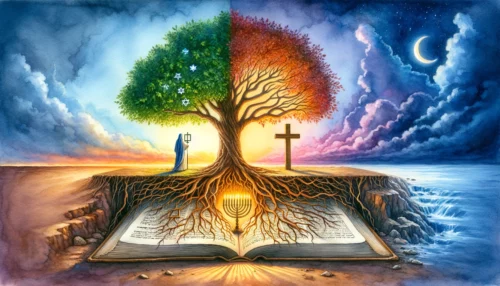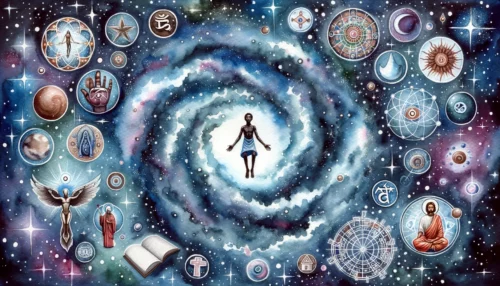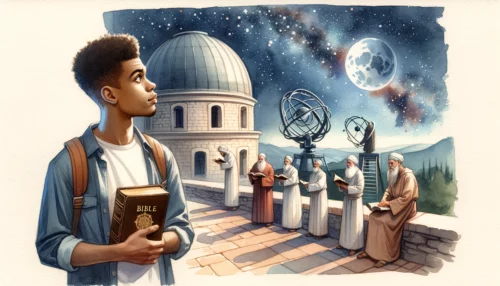When examining the multitude of religions that span our globe, each one presents a unique set of beliefs, rituals, and ideologies. Yet, among this diversity, Christianity stands out, not merely due to its historical significance or numerical strength, but because of its core tenets and principles rooted in the Bible. As we navigate through this narrative, our aim is to articulate the distinctiveness of Christianity from a Biblical vantage point. Our reflections will draw heavily on the Bible, the sacred text that shapes Christian thought and practice, and constitutes the primary source for understanding this religion’s unique characteristics.
Grace and Salvation: The Christian Message
At the heart of Christianity lies the transformative message of grace and salvation. This concept centers on the belief that humans, by their nature, cannot earn or achieve a right relationship with God through their own efforts or good deeds. Instead, it is through God’s grace – his unmerited favor – that this relationship is made possible. This grace comes to humanity through the life, death, and resurrection of Jesus Christ, which serves as a unique and definitive act of love and sacrifice (Ephesians 2:8-9).
Salvation, in Christian understanding, is more than just a theological term. It is a deeply personal experience that marks the beginning of a renewed relationship with God. Christians believe that salvation is a free gift from God, received through faith in Jesus Christ. By acknowledging one’s inability to reach God through personal merit and by accepting Christ’s sacrificial act, an individual is said to be ‘saved’ or ‘born again’ (John 3:3, Romans 10:9-10).
Unlike many religions that advocate self-effort or adherence to a prescribed set of laws or rituals for salvation, Christianity underlines that it is solely by God’s grace, through faith, that one is saved. This perspective is not about complacency or the absence of moral responsibility, but rather about acknowledging human limitations and accepting the divine initiative in redeeming mankind (Galatians 2:16).
Jesus’ sacrificial act on the cross symbolizes the ultimate expression of divine grace. In Christian understanding, he took upon himself the punishment due for human sin, thus opening the way for humanity’s reconciliation with God. This act of atonement is what sets Christianity apart in the religious landscape, where other faiths often emphasize human effort as the primary means of achieving divine favor or enlightenment (1 Peter 2:24).
The Christian message of grace and salvation reflects a belief in the unmerited love and favor of God, expressed supremely in the sacrificial act of Jesus Christ. While many religions promote the pursuit of divine favor through human effort, Christianity stands apart in its emphasis on God’s initiative in offering salvation. This foundational tenet underscores the uniqueness of the Christian faith among the world’s religions.
Jesus Christ: The Unique Centerpiece of Christianity
Christianity is distinct in its focus on the person and work of Jesus Christ. No other religion places a single individual at the center of its belief system in the same way Christianity does with Jesus. Regarded as the Son of God, Jesus is believed to have been both fully human and fully divine, a concept known as the Hypostatic Union (John 1:14).
The life of Jesus, as detailed in the New Testament, portrays him as a unique figure who performed miracles, taught with authority, and demonstrated a love and compassion that transcended societal norms. But it is his death and resurrection that are most central to Christian belief. Christians believe that Jesus willingly laid down his life as a sacrifice for humanity’s sins, and that he rose from the dead three days later. This event, known as the Resurrection, is seen as the ultimate victory over sin and death, and the assurance of eternal life for believers (1 Corinthians 15:3-4).
Jesus’ role as a mediator between God and humans is another unique aspect of Christianity. Other religions might view God as distant or abstract, but Christianity presents a God who took human form in Jesus Christ to reach out to humanity. As such, Jesus is often referred to as the ‘Word made flesh’ or the ‘image of the invisible God’, implying that to know Jesus is to know God (John 1:14, Colossians 1:15).
Christianity also stands apart in its belief in Jesus’ second coming. Christians anticipate a future event where Jesus will return to judge the living and the dead and establish God’s eternal kingdom (1 Thessalonians 4:16-17). This belief shapes the Christian understanding of history and the future, adding an eschatological dimension that is distinctive.
Christianity’s distinctiveness is rooted in its belief in Jesus as the Son of God, who came to earth, died for humanity’s sins, and was resurrected. The Christian view of Jesus as both fully human and fully divine, the mediator between God and humanity, and the promised returning king, sets it apart from other religions. These beliefs about Jesus, along with the anticipation of his second coming, form the crux of what makes Christianity unique.
The Triune God: A Distinctive Christian Doctrine
Another key aspect that distinguishes Christianity from other religions is the concept of the Trinity, or the Triune God. The Trinity refers to the understanding of God as one being, existing eternally in three distinct persons: God the Father, God the Son (Jesus Christ), and God the Holy Spirit. While the word ‘Trinity’ is not found in the Bible, the concept is rooted in Scripture and has been a central tenet of Christian belief since the early church (Matthew 28:19).
The doctrine of the Trinity sets Christianity apart from both monotheistic and polytheistic religions. In monotheistic faiths, such as Judaism and Islam, God is understood to be one person, while polytheistic religions posit the existence of multiple gods. Christianity, however, embraces a unique understanding of the oneness of God expressed in three persons, each of whom is fully God yet distinct in their personhood (2 Corinthians 13:14).
God the Father is depicted as the creator of all things, the source of life and the one who sustains the universe. Jesus Christ, as previously discussed, is the Son of God who came to earth to save humanity through his life, death, and resurrection. Finally, the Holy Spirit is believed to be God’s active presence in the world, guiding, comforting, and empowering believers (John 14:26, Acts 1:8).
The concept of the Trinity is admittedly difficult to fully comprehend, but it is a foundational doctrine that significantly shapes Christian belief and practice. It informs the understanding of God’s nature, how God interacts with humanity, and the way in which believers relate to God. It emphasizes the interconnectedness of God’s love, grace, and redemptive work through the Father, Son, and Holy Spirit (Ephesians 1:3-14).
The concept of the Triune God, existing as one being in three distinct persons, sets Christianity apart from other monotheistic and polytheistic religions. The understanding of God as Father, Son, and Holy Spirit has profound implications for Christian belief and practice, emphasizing the interconnectedness of God’s love, grace, and redemptive work. This doctrine further underscores the uniqueness of Christianity in the religious landscape.
Drawing Together the Threads: A Final Reflection
We’ve journeyed through the unique characteristics of Christianity: the transformative message of grace and salvation, the centrality of Jesus Christ, and the distinctive doctrine of the Triune God. It is these aspects, among others, that set Christianity apart in a world of diverse religions.
As you reflect on this narrative, consider these questions:
- How does the concept of grace and salvation in Christianity impact your view of human merit and divine favor?
- In what ways does the centrality of Jesus Christ in Christianity influence your understanding of the nature of God and his relationship with humanity?
- How might the doctrine of the Trinity shape your perception of God’s interconnected work in the world?
Each day offers fresh opportunities to explore and experience the richness of faith, the wonder of divine mysteries, and the beauty of spiritual truths. The story of Christianity, with its unique tenets and teachings, invites us all into a grand narrative of love, grace, and redemption.














